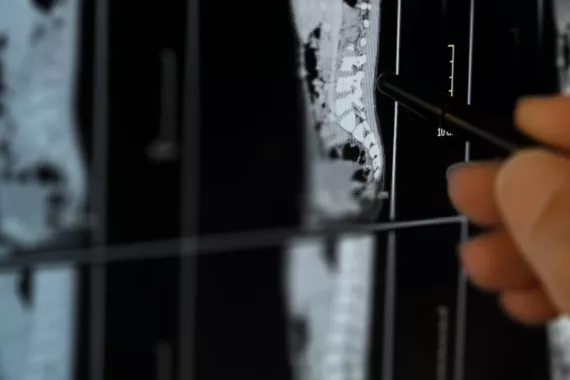The Legal Team
- Kimberly Barone Baden
- Esther E. Berezofsky
- Victoria D. Blatterman
- Ebony Williams Bobbitt
- Grace P. Chandler
- Moniqúe Alycia Christenson
- Jessica C. Colombo
- Sara O. Couch
- Kevin R. Dean
- John M. Eubanks
- Olutola "Tola" Familoni
- Fidelma L. Fitzpatrick
- Jodi Westbrook Flowers
- Rebecca A. Fonseca
- Vincent L. Greene IV
- Jade A. Haileselassie
- Nicholas R. Harris
- Andrew D. Harris
- Lee M. Heath
- T. David Hoyle
- Shalom D. Jacks
- Marlon E. Kimpson
- Annie E. Kouba
- W. Taylor Lacy
- Daniel R. Lapinski
- James W. Ledlie
- Paul T. Lyons
- Ridge Mazingo
- Kate E. Menard
- Grace Mickle
- Donald A. Migliori
- Chelsea L. Monroe
- Joshua M. Neuman
- John David O'Neill
- Lance Oliver
- Jonathan D. Orent
- Julia Rhine
- Joseph F. Rice
- Josey M. Richards
- Ann K. Ritter
- Jacob R. Stout
- Jackson Vause
- M. Nolan Webb
Personal Injury Lawsuits Overview
If someone else’s negligent or wrongful actions hurt you or someone you love, they — not you or your family — should pay for their mistakes. Motley Rice helps clients recover compensation for personal injuries. We can seek justice while you focus on healing and recovery.
Key terms
- Compensation: Compensation, or damages, is the money injured parties request from at-fault parties in a personal injury lawsuit. Compensation can include economic damages, noneconomic damages and punitive damages.
- Economic damages: Economic damages, or compensatory damages, are tangible, calculable losses. They include current and future injury-related expenses such as emergency medical costs, ongoing medical treatments, and wages lost from missing work due to physical impairment.
- Injunctive relief: Injunctive relief is a kind of court order intended to keep behavior in line. Injunctions stop people or entities from doing certain things or require them to act in a specific way.
- Liable: This means to be held legally responsible. The courts determine who is liable for an injury. If you file a case against multiple defendants, the court will determine how to split up that liability into percentages.
- Noneconomic damages: Noneconomic damages, or pain and suffering damages, are intangible losses. These damages relate to a victim’s physical, mental and emotional well-being. They are subjective, and the court will determine the amount awarded.
- Punitive damages: Punitive damages punish defendants for misconduct. These damages seek to prevent future bad behavior. Generally, punitive damages are awarded more rarely than economic and noneconomic damages. State laws vary regarding whether you can pursue punitive damages for a personal injury, and in what amount.
- Negligence: Negligence is the most common basis for personal injury claims. A party acts negligently when they do not behave with the same level of care or reason that others would have exercised under the same circumstances. For example, most drivers don’t drive drunk or run red lights.
- Statute of limitations: This is any law that bars legal claims after a certain period of time following an injury.
- Strict liability: Strict liability holds a defendant liable for their actions regardless of whether they acted negligently. Strict liability can sometimes be the basis for dog bite claims and product liability claims.
What is a personal injury lawsuit?
What is a personal injury lawsuit?
A personal injury lawsuit is a civil court action. This type of case seeks to hold parties accountable for harm they caused another person. Personal injury cases determine two primary issues — liability and damages. If you can prove an at-fault party’s negligent behavior led to your accident and injury (liability), you can recover financial compensation (damages).
What constitutes personal injury?
Several types of harm may constitute a personal injury. Most personal injury claims deal with bodily injuries. Cases can also address emotional injuries, invasion of privacy, and damage to an individual’s reputation.
Accidents and injuries that can lead to personal injury lawsuits include:
- Automotive accidents: According to 2022 statistics from the National Safety Council (NSC), automotive accidents are the third leading cause of preventable injuries in the United States. This stat applies to both deaths and non-fatal injuries. Motor vehicle collision claims include car accidents, motorcycle accidents, pedestrian accidents, bicycle accidents, truck accidents, commercial vehicle collisions and bus accidents.
- Dog bites: When dogs bite, victims can seek compensation from the pet’s owner. Dog bite liability varies by state. Some states hold owners strictly liable, while other states follow a one-bite rule. A one-bite rule requires victims to prove the dog’s owner knew or should have known their dog was capable of biting.
- Medical malpractice: Medical malpractice lawsuits seek compensation for injuries caused by medical negligence. You may have a claim if a physician failed to treat you or provided substandard care that resulted in an injury, illness or death. Examples include failure to diagnose, misdiagnosis, medication errors and surgical errors. Motley Rice doesn’t typically accept medical malpractice cases.
- Premises liability: Premises liability deals with harm caused by negligent, unsafe or hazardous property conditions. Slip-and-fall accidents are a common type of premises liability case.
- Product liability: Product liability claims address injuries caused by defective products, drugs and medical devices, defective automobiles and component parts. Products can be defective based on design, manufacturing and marketing flaws. Generally, product liability cases rest on strict liability, but some states require that victims prove negligence.
- Workplace injuries and illnesses: Workplace injury cases deal with on-the-job accidents and hazardous workplaces.
If one of the above results in death, qualifying survivors may be able to pursue a different type of case called a wrongful death lawsuit. Wrongful death suits allow eligible family members and dependents to seek compensation for a loved one’s fatal injury. It may help to think of a wrongful death case as an opportunity to pursue personal injury compensation the injured party could have sought had they lived.
When to get a personal injury lawyer
When to get a personal injury lawyer
A personal injury lawyer can be essential in a dispute involving a serious injury or wrongful death. Some parties may be reluctant to fairly compensate those harmed by their alleged negligence.
An attorney can:
- Assess applicable laws and statutes of limitations
- Determine a reasonable amount for economic, non-economic and punitive damages
- Establish the other party’s liability for serious injuries or wrongful death
- Gather evidence to argue on your behalf
- Represent you in legal proceedings involving the defendant, insurance companies and other parties
If you or a loved one have suffered serious harms through another party’s negligence, getting an attorney can be the first step in seeking justice.
Can you change lawyers in a personal injury case?
It’s possible to change attorneys in the middle of a case. The exact process for changing lawyers may vary by jurisdiction. If your case is nearly ready to go to trial, you may need a judge’s approval.
It’s helpful to coordinate any payments with your outgoing and incoming attorneys; disagreements on fees owed may involve arbitration. The attorneys may also need to file paperwork to make the change of legal counsel official. If you want to replace your attorney, consider finding a replacement before ending your relationship with your current counsel.
Types of personal injury lawsuits handled by Motley Rice
Types of personal injury lawsuits handled by Motley Rice
Motley Rice helps individuals and families seek justice for non-fatal and fatal injuries caused by negligence and wrongdoing. Our personal injury attorneys handle numerous types of cases, including those involving:
- Childhood injuries
- Complications from medical drugs like Depo-Provera®, Ozempic® and Wegovy®
- Defective medical device injuries from products like hernia mesh, insulin pumps and IVC filters
- Exploding electronic cigarettes (e-cigs)
- Exploding lithium-ion batteries
- Fires, explosions and burn injuries
- Head trauma and traumatic brain injuries
- Spinal cord injuries
- Toxic exposure injuries from dangerous chemicals, including PFAS, paraquat and Roundup®
- Transportation incidents
- Vehicle defects, including ARC airbag inflator lawsuits, Takata airbag injury lawsuits and gearshift defect lawsuits
- Women’s health-related injuries, such as those caused by defective birth control, hair relaxers and talcum powder
Personal injury lawsuit process
Personal injury lawsuit process
The personal injury lawsuit process can be complex. Injury lawsuits may involve accident investigations, insurance claims, negotiating with opposing parties and going to trial. To win compensation, your attorney must build a solid claim based on evidence.
Proving personal injury
Proving you suffered a personal injury requires establishing that the harm you sustained resulted from negligence. Your case must demonstrate that:
- The defendant owed you a legal duty of care: As members of society, we all have a duty not to cause deliberate harm to one another. The specific duty of care can vary by case type. For example, pharmaceutical companies have a responsibility to ensure the medications they manufacture and market are effective and that consumers know about potential side effects.
- The defendant breached the duty of care: A defendant breaches the duty of care when they act in a manner that a reasonable person wouldn’t find appropriate or necessary when presented with similar circumstances. A breach of duty can also be a failure to act when required.
- The plaintiff suffered harm: The plaintiff suffered bodily harm.
- The breach of duty was the cause of the plaintiff’s harm: The defendant’s breach of duty caused the plaintiff’s harm. For example, an injury lawsuit may show that a vehicle manufacturer knew of a design defect in a car’s airbags but failed to remedy the problem. This defect could result in the airbag not deploying, ultimately causing the victim to suffer a broken rib and internal injuries.
Personal injury claims must be supported by evidence. Evidence will vary based on the type of accident and the facts of an individual case. Common examples of evidence in a personal injury lawsuit include:
- Bills, receipts, wage records, invoices, estimates and other proof of damages
- Expert reports and testimony
- Eyewitness statements
- Medical records
- Photographs, videos and physical debris from the accident scene
- Police reports or official incident reports
- Surveillance, cell phone, traffic camera or dashcam footage
- Testimony from medical professionals
Constructing a robust case can be challenging for those without prior legal experience. It can be even harder when dealing with a severe injury. Complicated accidents, multiple liable parties and aggressive opposition can make suing for personal injury especially difficult.
Attorneys with personal injury case experience can advocate for you and use their knowledge and experience to manage your lawsuit.
Filing a personal injury lawsuit
Some personal injury lawsuits begin with filing an insurance claim against an at-fault party. Depending on the kind of accident that’s occurred, this claim could take the form of a residential or commercial property claim, an auto insurance claim, or some other type of liability insurance claim.
Once you file, your attorney will investigate the accident. The information uncovered will be used in negotiations. If the insurance company refuses to offer a fair settlement, you can file a personal injury lawsuit.
If there’s no insurance coverage that applies to your case, you can proceed to filing a personal injury lawsuit in civil court. As with an insurance claim, your lawyer will begin to investigate after you file your claim. Your attorney will exchange information with the defendant’s legal counsel during a process called discovery. From there, the case may proceed to trial. However, parties can still reach a settlement agreement up until (and even after) a judgment is rendered.
Each state has its own statute of limitations for how long you can wait to file a lawsuit for personal injury in civil court. The deadline in many states is two years, but some states allow for as little as one year or as long as six years. If time expires, you’ll likely be unable to take legal action.
How personal injury claims work
Many steps are involved in pursuing personal injury compensation. In general, most cases will go through the following process:
- You suffer an injury: You suffer an injury and incur related damages due to another party’s negligent or wrongful actions.
- You speak with a law firm: An attorney reviews your case and discusses your legal options with you.
- Your lawyer investigates the accident: Your attorney builds your claim with evidence, identifies liable parties, and identifies your damages and options for financial recovery.
- Your lawyer files a lawsuit: Your lawyer puts forth a personal injury lawsuit against those believed to be at fault. If insurance coverage is available, your attorney may first attempt to resolve your case with an insurance settlement.
- Discovery: During discovery, parties prepare for trial and exchange evidence and information. Victims and others involved may need to provide testimony during a deposition. Parties can agree to settle the case at any point during the discovery phase.
- Settlement or trial: Many lawsuits settle before trial. If not, parties will present their case before the court or a jury. Parties can still settle at any point during court proceedings and even negotiate a judgment after it’s rendered.
Personal injury lawsuit damages
Personal injury lawsuit damages are determined using evidence, proof of your actual expenses, and testimony detailing your pain and suffering. In general, compensation may include:
- Economic damages: Common economic damages include current and future medical expenses, lost income, lost employment benefits, lost future earning capacity, household services and personal property damages.
- Noneconomic damages: These may include monetary awards for physical pain and suffering, loss of enjoyment, loss of reputation, mental anguish, emotional distress and humiliation.
- Punitive damages: Punitive damages have nothing to do with losses the victim has suffered. Instead, a jury or court can assess these damages against a liable party in cases involving gross or wanton negligence, serious misconduct or recklessness. Punitive damages are designed to punish the defendant. These awards are rare, though, and some states don’t allow for them.
Receiving compensation for a personal injury can take several months to a year, or longer. Numerous factors can influence the length of a lawsuit, some include the accident’s complexity, the severity of the injuries, and whether the case settles via negotiations or proceeds to a trial.
How much are most personal injury settlements?
How much a particular personal injury settlement is worth will depend on the unique facts of that case, including the severity of the victim’s injuries, the extent of their medical treatment, their age and their current wages.
It’s unethical for a lawyer to promise any outcome or settlement amount for a personal injury lawsuit. Any lawyer who does this isn’t acting in your best interests.
Our experience handling personal injury lawsuits
Our experience handling personal injury lawsuits
Motley Rice attorneys have advocated for the rights of individuals, families, workers and consumers for decades. If you or someone you love sustained an injury caused by negligence or wrongdoing, we have the legal experience and resources to aggressively seek full and fair personal injury compensation.
We are here to help hold responsible parties accountable and help you pursue justice. While you focus on healing or caring for your hurt family member, we will work to relieve your legal burden and provide you with information and support.
Contact Us
If you think you have a Personal injury claim, consider contacting an attorney to get more information and find out your legal options.
Connect with a LawyerYou can also contact us by calling1.800.768.4026

